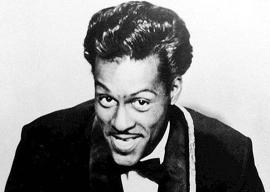
April 11, 2017

Chuck Berry
Source: Wikimedia Commons
I call them the “Ackchyuallies“: the concern trolls who reflexively politicize and pollute every occasion of mass recollection, wailing, “Columbus was a mass murderer!” and “Thanksgiving is racist!“
But when rock & roll pioneer Chuck Berry died last month, for once these human toothaches were onto something. I”d call them “party poopers” except that, in this instance, that sounds too much like something the target of their scorn would have enjoyed.
Readers of a certain vintage may recall that, in 1961, Berry was found guilty of transporting an underage girl across state lines for “immoral purposes.” However, they might still be blissfully ignorant of his other, more scatological perversions, like Berry’s (costly) habit of secretly filming women and girls in the washrooms of his Missouri restaurant.
As a female Guardianista complained, not unreasonably:
The “New York Times” obituary of Berry…didn”t mention the Escalanti case until the 23rd paragraph; the so-called “potty camera” scandal was entirely absent. Instead, the news coverage of his death leaned on soothingly euphemistic terms like “legal troubles” and “colourful life.”
The longer “Chuck Berry” trended on Twitter, the higher the volume of reactions like this became:
Wasn”t Chuck Berry a bankrobber, a statutory rapist, alleged child abuser, and installed cameras in a women’s restroom at his restaurant?
“Robert Dobalina, Jr. (@Linhem) March 19, 2017
(Speaking of “sex tapes”: Wait until they find out that Berry’s biggest midcareer hit, “My Ding-a-Ling,” was “filled with innuendo about masturbation and recorded in front of school children in Coventry.”)
Of course, all these prim protestations were buried beneath the gush of sanitary, hyperbolic eulogies from reliably liberal, nay, feminist celebrities like Bruce Springsteen. Indeed, Berry’s death provided them with a brief respite from their burning preoccupation with (a) 12-year-old audio of Donald Trump musing about pussy grabbing, and (b) a so-far imaginary video of him supposedly indulging in some Berry-esque sex play.
This worshipful outpouring was inadvertently revealing, psychologically: Berry famously treated other musicians like dirt, once punching Keith Richards”who worshipped the man”in the eye. (The Who shared a bill with Chuck Berry in 1969. “The Who loved Chuck Berry, we all loved Chuck Berry,” recalled DJ Jeff Dexter. “Unfortunately Chuck was a cunt to everybody else.”)
But others in the left-leaning pro-Berry camp hurried to use his death to make a point about”you guessed it”racism.
Look: I loathe thin-skinned numpties who detect “racism” everywhere (I hear “milk is white supremacist“ now…). But again, I”m forced to admit that in this instance, the “Ackchyuallies” had a valid point:
That “Chuck Berry” sequence in Back to the Future was indeed the most racially tone-deaf scene in American cinema since Mickey Rooney and his prosthetic teeth rendered Breakfast at Tiffany’s unwatchable in 1961.
That is: In Back to the Future‘s climactic scene, (very white) 1980s kid Marty McFly, having accidentally time-traveled to the early 1950s, “invents” rock & roll by performing Berry’s “Johnny B. Goode” (complete with duck walk) at a high school dance. In the wings, the leader of the (black) combo originally hired to provide the evening’s more subdued musical entertainment phones his “cousin” Chuck Berry, yells, “Listen!” and holds out the receiver in the direction of McFly’s ringing guitar.
I defy even Richard Spencer to sit through this scene without cringing. But for the accidental-on-purpose intervention of some random Caucasian kid, certain African-American musicians would never have composed their own songs? The “Magical Negro“ trope is troublesome enough; in Back to the Future, it slathers on whiteface. Just appallingly insulting and ignorant.
But while those who find that scene unforgivably wrongheaded are right, they don”t go far enough. To do so uncovers a more complicated story.
Tellingly, Chuck Berry himself, a notoriously petulant diva, never commented on the Back to the Future travesty. The generous compensation he received for the use of his song in the movie couldn”t be the reason; surely he was free to complain forever once the check cleared. And next to making money, screwing jailbait, and coprophilia, Berry’s favorite pastime was seething.
But the thing is: While Chuck Berry always acknowledged, in passing, early influences like Louis Jordan and T-Bone Walker, it was white music-geek rock journos who revealed that, in fact, Berry “stole his “Johnny B. Goode” guitar riff” from Jordan’s 1946 record “Ain”t That Just Like a Woman,” and the song’s guitar break from Walker’s 1950 “Strollin” With Bones.”